Klimawandel in Afrika - Streit um Land und WasserStichwörter: Wasser Indigene Klimawandel Raubbau
Während Staats- und Regierungschefs der Welt, Umweltorganisationen und Klimaforscher nach dem besten Weg suchen, den Klimawandel einzudämmen und um jedes Gramm Kohlenstoffdioxid gestritten wird, geschieht in manchen Regionen dieser Erde unglaubliches: Klimawandel findet tatsächlich schon statt ... oder: manche Gegenden zeigen heute schon Erscheinungen, wie sie mit dem Klimawandel künftig mit Sicherheit häufiger anzutreffen sein werden.
Im äthiopisch-kenianischen Grenzgebiet, an den Ufern des Flußes Omo und des Turkanasees leben seit Generationen Viehhirten und Nomaden. Doch durch das sich verändernde Klima in der Region, d.h. vor allem weniger Regenfälle, zunehmende Verdunstung, aber auch Dammprojekte entlang des Omo, schrumpft der See und hat sich fast komplett von äthiopischem Gebiet nach Kenia zurückgezogen.
Die auf äthiopischem Gebiet ansässigen Viehhirten folgen mit ihren Herden natürlich dem Wasser und stoßen so auf kenianisches Gebiet und in das anderer Nomadengruppen vor. Die Folge sind gewaltsam ausgetragene Konflikte um Wasser und Land, deren Auswirkungen im Film When the Water Ends dokumentiert werden.
Einige Bilder aus dem Film (unten) lassen schon erahnen, was den Menschen in den vom Klimawandel besonders bedrohten Regionen droht.
Den Film selbst gibt es auf der Website der 'Yale School of Forestry & Environmental Studies' zu sehen. Zum Film 'When the Water Ends'
When The Water Ends: Africa’s Climate Conflicts
For thousands of years, nomadic herdsmen have roamed the harsh, semi-arid lowlands that stretch across 80 percent of Kenya and 60 percent of Ethiopia. Descendants of the oldest tribal societies in the world, they survive thanks to the animals they raise and the crops they grow, their travels determined by the search for water and grazing lands.
These herdsmen have long been accustomed to adapting to a changing environment. But in recent years, they have faced challenges unlike any in living memory: As temperatures in the region have risen and water supplies have dwindled, the pastoralists have had to range more widely in search of suitable water and land. That search has brought tribal groups in Ethiopia and Kenya in increasing conflict, as pastoral communities kill each other over water and grass.
“When the Water Ends,” a 16-minute video produced by Yale Environment 360 in collaboration with MediaStorm, tells the story of this conflict and of the increasingly dire drought conditions facing parts of East Africa. To report this video, Evan Abramson, a 32-year-old photographer and videographer, spent two months in the region early this year, living among the herding communities. He returned with a tale that many climate scientists say will be increasingly common in the 21st century and beyond — how worsening drought in parts of Africa, the Middle East, and elsewhere will pit group against group, nation against nation. As one UN official told Abramson, the clashes between Kenyan and Ethiopian pastoralists represent “some of the world’s first climate-change conflicts.”
But the story recounted in “When the Water Ends” is not only about climate change. It’s also about how deforestation and land degradation — due in large part to population pressures — are exacting a toll on impoverished farmers and nomads as the earth grows ever more barren.
The video focuses on four groups of pastoralists — the Turkana of Kenya and the Dassanech, Nyangatom, and Mursi of Ethiopia — who are among the more than two dozen tribes whose lives and culture depend on the waters of the Omo River and the body of water into which it flows, Lake Turkana. For the past 40 years at least, Lake Turkana has steadily shrunk because of increased evaporation from higher temperatures and a steady reduction in the flow of the Omo due to less rainfall, increased diversion of water for irrigation, and upstream dam projects. As the lake has diminished, it has disappeared altogether from Ethiopian territory and retreated south into Kenya. The Dassanech people have followed the water, and in doing so have come into direct conflict with the Turkana of Kenya.
The result has been cross-border raids in which members of both groups kill each other, raid livestock, and torch huts. Many people in both tribes have been left without their traditional livelihoods and survive thanks to food aid from nonprofit organizations and the UN.
The future for the tribes of the Omo-Turkana basin looks bleak. Temperatures in the region have risen by about 2 degrees F since 1960. Droughts are occurring with a frequency and intensity not seen in recent memory. Areas once prone to drought every ten or eleven years are now experiencing a drought every two or three. Scientists say temperatures could well rise an additional 2 to 5 degrees F by 2060, which will almost certainly lead to even drier conditions in large parts of East Africa.
In addition, the Ethiopian government is building a dam on the upper Omo River — the largest hydropower project in sub-Saharan Africa — that will hold back water and prevent the river’s annual flood cycles, upon which more than 500,000 tribesmen in Ethiopia and 300,000 in Kenya depend for cultivation, grazing, and fishing.
The herdsmen who speak in this video are caught up in forces over which they have no real control. Although they have done almost nothing to generate the greenhouse gas emissions that cause global warming, they may already be among its first casualties. “I am really beaten by hunger,” says one elderly, rail-thin Nyangatom tribesman. “There is famine — people are dying here. This happened since the Turkana and the Kenyans started fighting with us. We fight over grazing lands. There is no peace at all.”
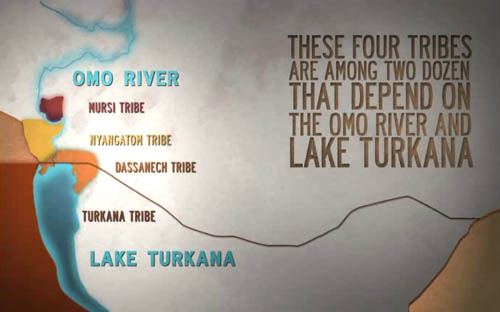
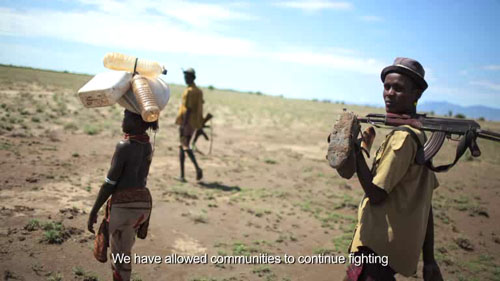
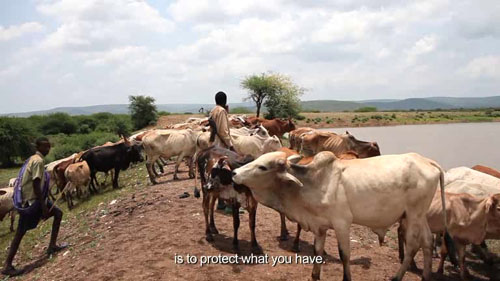
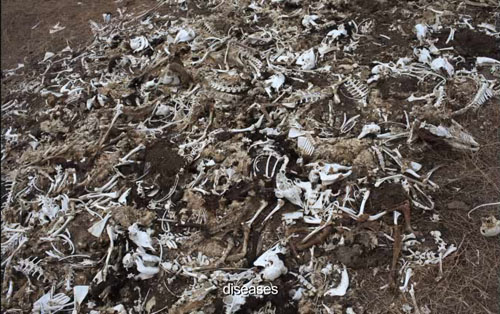
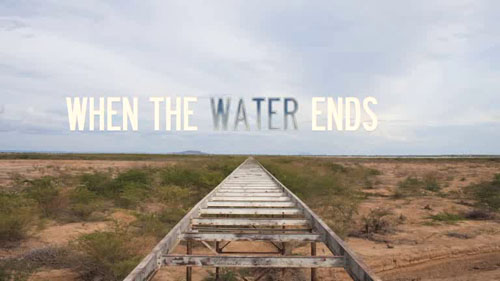
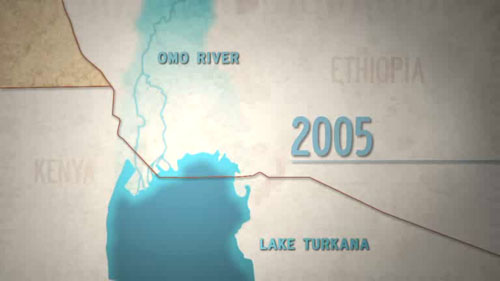
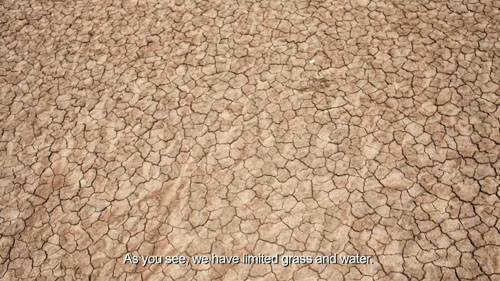
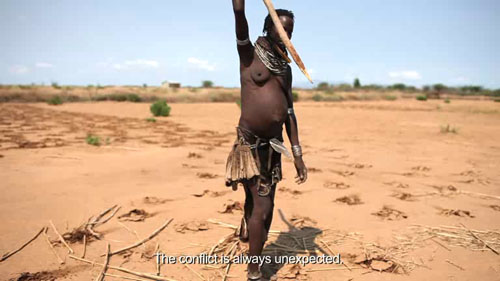
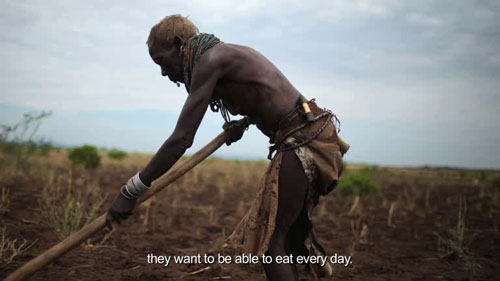
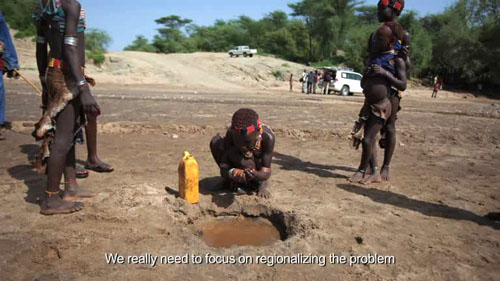
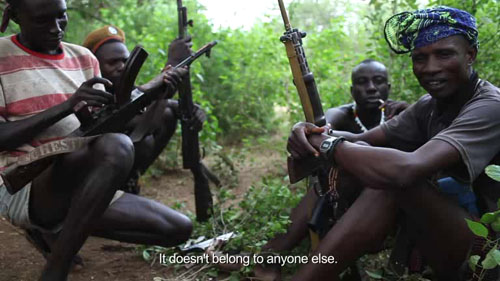

hallo es ist lustig das anzuschauen